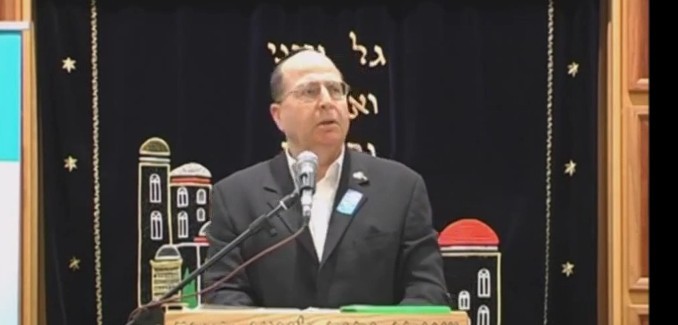Pushing back against claims that the alternative to the current nuclear negotiation framework with Iran is war, Israeli Defense Minister Moshe Ya’alon argued in an op-ed published Wednesday in The Washington Post that the protocols announced last week actually make war more likely.
As Israel’s minister of defense, as a former Israel Defense Forces chief of general staff and as a combat veteran forced to bury some of my closest friends, I know too well the costs of war. I also know that Israelis are likely to pay the highest price if force is used — by anyone — against Iran’s nuclear program. No country, therefore, has a greater interest in seeing the Iranian nuclear question resolved peacefully than Israel. Our opposition to a deal based on the framework is not because we seek war, but because the terms of the framework — which will leave an unreformed Iran stronger, richer and with a clear path to a bomb — make war more likely.
The framework is supposed to prevent or detect Iranian denials and deception about their nuclear program by means of inspections and intelligence. Unfortunately, the track record of inspections and intelligence makes the framework’s outsize reliance on them both misguided and dangerous.
In many ways, the Iranian nuclear crisis began and intensified after two massive intelligence failures. Neither Israeli nor other leading Western intelligence agencies knew about Iran’s underground enrichment facilities at Natanz and Fordow until it was too late. As good as our intelligence services are, they simply cannot guarantee that they will detect Iranian violations at all, let alone in time to stop a dash for a bomb.
Ya’alon also drew a parallel to the agreement reached with North Korea in the 1990’s, which depended on inspections to prevent that nation from developing nuclear weapons. As Ya’alon writes, “Today, North Korea is a nuclear weapons state.” Furthermore, the parameters of the current deal would leave Iran’s nuclear infrastructure in place “to produce a nuclear arsenal.”
Ya’alon concluded by arguing that a “better deal” could force Iran to roll back its nuclear program and end “Iran’s aggression in the region, its terrorism across the globe and its threats to annihilate Israel.”
Ya’alon’s conclusion is consistent with the argument made by former Secretaries of State Henry Kissinger and George Schultz Wednesday in The Wall Street Journal that a deal that isn’t linked to Iran accepting “restraint on its ability to destabilize the Middle East” won’t be effective.
[Photo: Yedidya Nahary / YouTube ]




